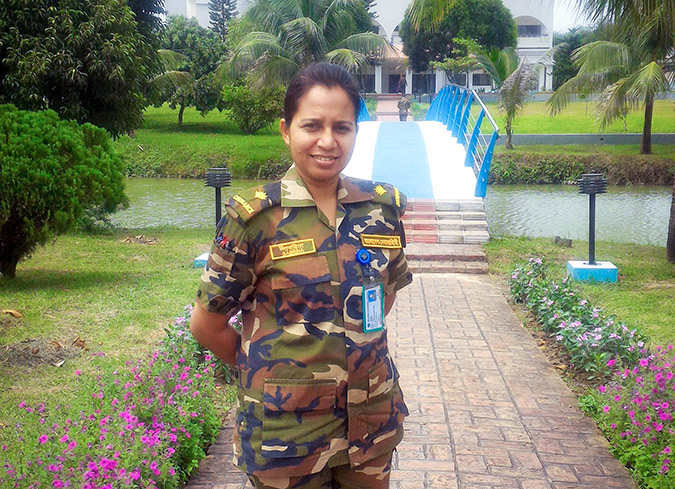From where I stand: “I have a strong role to play as a UN Peacekeeper from Bangladesh, I need to make my nation proud.”
Sabrina Asad Hima was amongst the first batch of women who were sent from Bangladesh as UN Peacekeepers. Sabrina was commissioned to Côte d’Ivoire in 2012.Date:

“From a very early age I had a strong liking towards the uniform. My father was in the army, so I had grown up seeing him as an inspiration. But as women were not allowed in the army then, I studied science and planned to become a doctor. I didn’t think my wish would ever come true. In 2000 a circular said women were to be included in the army. Around 17,000 women applied, and only 57 were accepted. I was one of the lucky few.
There were many challenges I had to face in a male-dominated profession. Women in our country do not have the opportunity and are not expected to be physically strong. But the army trains us in both physical and mental aspects. Since we were the first intake of women, many of the trainings were experimental and were later adapted to cater to our ability. For example, it was difficult for women to do para-jumps and some female officers were injured, so it was later left out of the programme. Also, female soldiers needed more time to do long runs than men, so the time allowance for women was increased. Unlike fellow male officers, women also have to balance their work and the important role that they play at home taking care of their family.
But as a peacekeeper, while representing Bangladesh, it is also our duty to serve the country we are sent to. Bangladesh contributes one of the largest contingents, be it male or female. We must never forget the role that Bangladesh is playing in peacekeeping.”
As a female soldier, Sabrina Asad Hima, travelled miles from home and was working in an unknown environment, leaving her family behind. She was settling a new trend as barrier breaker for women peacekeepers from Bangladesh. Since 1994, the Bangladesh Army has been involved in up to thirty different UN Peacekeeping Operations covering as many as twenty-five countries. More than 83,000 personal both women and men of Bangladesh having served in those missions. Her work contributes to Sustainable Development Goal 5 on gender equality and Goal 16 on reducing all forms of violence and working with governments and communities to find lasting solutions to conflict and insecurity.